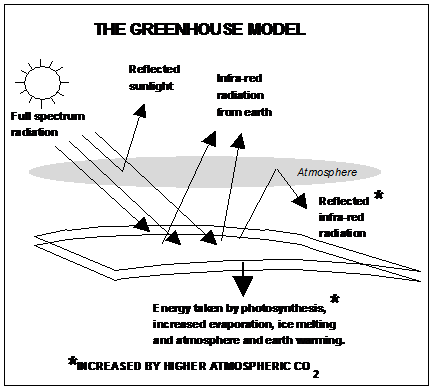The Greenhouse Hypothesis
Increasing carbon dioxide (CO2) and other gases including methane (CH4), oxides of nitrogen (NOX) and CFCs may result in global warming[3] (the Greenhouse Effect) which may cause other serious effects threatening the planet. These include ocean warming and higher levels, due to expansion and ice melting, and changed weather patterns. These in turn may effect our ability to grow food, may result in the inundation and destruction, by storms, of homes and productive land and may cause increasing levels of extinction of plants and animals.
Many scientists today support the hypothesis that carbon dioxide is the main causal factor in planetary warming. Carbon dioxide increases the absorption of solar radiation by restricting the passage of reflected or re-emitted solar radiation that would otherwise be radiated back into space (see diagram). But the actual rate of warming due to carbon dioxide is unknown and can only be estimated with the aid of computer models.

Carbon dioxide presently makes up about 0.034% of the Earth's atmosphere. It is produced by the oxidisation of carbon, previously fixed by living things, and by release from the Earth's core. Although there have been many changes in this level in the past, for many millions of years these have been slow and the planetary carbon cycle has been in approximate equilibrium. As carbon dioxide increases (following volcanic activity or climatic change) so plant growth on land and in the sea increases to absorb it.
The relationships involved are very complex. Carbon dioxide is not the only gas responsible for the greenhouse effect. Other gasses and water vapour also play important roles. Water vapour (particularly as clouds) reflects incoming radiation. Water vapour (humidity) is in much higher concentrations than carbon dioxide and is far more variable in concentration, as we all know (sometimes its clear, sometimes its cloudy, sometimes dry and sometimes raining). The median amount of atmospheric water vapour can be expected to rise as the planet warms.
One of the pieces of evidence for the greenhouse effect is a strong correlation over the past 100,000 years between carbon dioxide levels and atmospheric temperature. Although it is possible that higher temperatures result in higher carbon dioxide levels (warm oceans dissolve less CO2) or that both resulted in the past from some common cause (such as volcanoes) many scientists believe that this is evidence that higher carbon dioxide levels will indeed result in planetary warming.
According to a majority of qualified scientists, the present increase in carbon dioxide in the atmosphere, due to the increased demand for energy, is an important factor of change in the predicted warming of the planet and consequent climatic change (the greenhouse effect). Experts assert that an effect that is now barely perceptible against the natural fluctuations in climate may become catastrophic if left unchecked.
All currently accepted models predict that increased absorption of solar energy will make some change in the Earth’s climate. Some existing plants, animals, peoples, businesses, industries and nations will suffer. Others may secure an advantage. The extent and rate of such changes is not yet known. If the changes are large and/or rapid, many more will suffer than will gain advantage[4].
